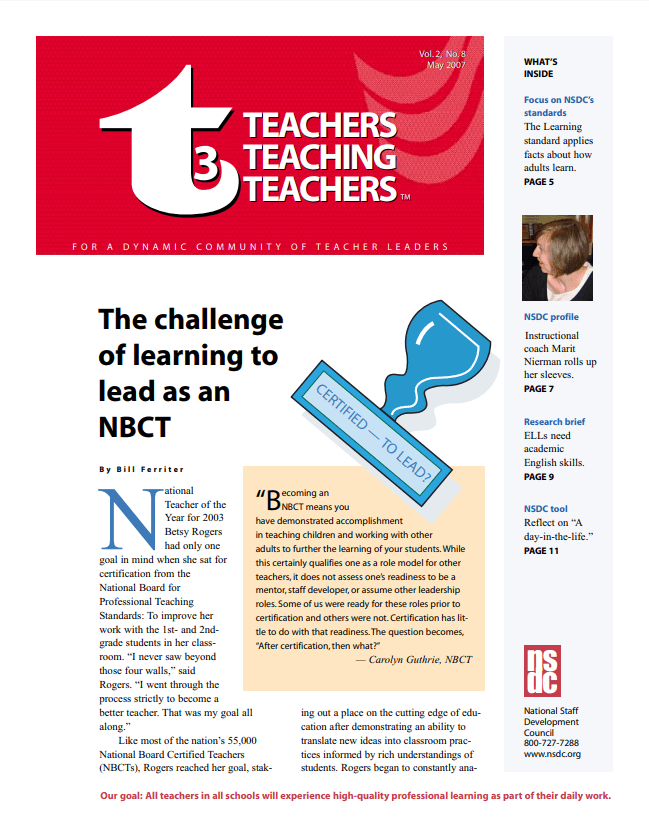
Teachers Teaching Teachers, May 2007, Vol. 2, No. 8

The challenge of learning to lead as an NBCT
Teachers who go through the process of becoming National Board Certified Teachers (NBCTs) are recognized as well-prepared, accomplished classroom teachers. But are they ready to become leaders of other teachers? Schools and districts are seeking ways to best make use of these skilled teachers. At the same time, NBCTs are often ready to take on school leadership roles. Read about the challenges teachers face when they take on leadership roles, written by Bill Ferriter, NBCT, school leader, and regular columnist and blogger for NSDC.
By Bill Ferriter
NSDC profile: Marit Nierman -- Coach lends them her ears
Marit Nierman of Garrison Middle School in Walla Walla (Wash.) Public Schools works as an instructional coach focused on literacy issues. Learn how Nierman collaborates with other secondary coaches, how she makes literacy matter to all content area teachers, and what skills she has worked to strengthen in her leadership role.
By Tracy Crow
Focus on NSDC's standards: Fit the strategy to the learner
As coaches interact with teachers, they use the Learning standard to shape the nature and the content of every conversation. The Learning standard states: Staff development that improves the learning of all students applies knowledge about human learning and change. Killion describes three stances a coach may take in interactions with teachers: expert, peer, and facilitator. She explains how coaches decide which stance to choose and when each stance might be appropriate.
By Joellen Killion
Focus on NSDC's standards: Keep an eye on the finish line
Professional development experiences need to be designed with a desired outcome in mind in order for participants to use what they have learned. Different outcomes require different ways of learning. In her column on the Design standard, Killion shares two vastly different professional learning scenarios to illustrate the standard in practice.
By Joellen Killion
Research brief: Reading and verbal skills are not enough
This month's Research brief reports on a study that indicates English language learners (ELLs), even those students who have good word reading and verbal skills, benefit from instruction in academic English. Native English speakers also benefit from such instruction. Learn more about what is considered academic English as well as specific steps teachers can take to promote language development in students.
By Carla Thomas McClure
NSDC tool: A day-in-the-life scenario
Use this tool to engage a group in storytelling to build a vision of a future based on goals or planned actions. Participants work in teams to describe specific details of what they would see in the school or classroom if they achieved their desired outcome. Scenarios can be useful when they are focused on a particular issue or question. An example: What will our school look like when more students in our 4th-grade class are scoring at grade level in reading?

